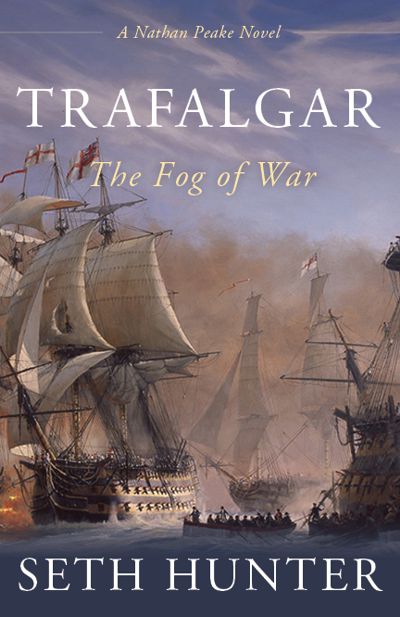
Blurb
The eighth volume in the thrilling adventure series featuring Nathan Peake, British naval officer and spy, during the French Revolutionary and Napoleonic Wars
“All I need is three days of fog,” Napoleon told his admirals, and they would have his greatest enemy at their mercy and the world at his feet.
It is 1803, and Britain and France are on the eve of war. Captain Nathan Peake, still in command of the sloop Falaise, is recruited to coordinate a secret operation to land agents and weapons on the coast of Brittany and Normandy to raise the flag of rebellion. Instead, he discovers that the real plan is to kidnap or assassinate Napoleon on the road to his country home of Malmaison on the outskirts of Paris. As Peake navigates the conspiracy and its aftermath, he finds his paths crossing with those of the legendary Sir Sidney Smith, American inventor Robert Fulton, and the Empress Josephine. But as the fog of war thickens, the risk of a chance encounter with someone who knows Peake’s true identity also grows. And all the while Napoleon is strategizing to divide his enemy and concentrate his forces on the weakest link. It has worked for the general many times on land—but will it now work at sea?
This is the story of the murders and intrigues, the myths and mysteries—and crucially the naval encounters—that preceded the most famous battle in nautical history. This is Nathan Peake’s Trafalgar, the true story of the events leading up to the campaign.
My Review
I am a newcomer to this series and have picked up Trafalgar as my introduction, since I wanted to know more about this naval battle. Happily, the book can be read as a stand-alone, so although I had to pay attention to the background details as I went along, my lack of familiarity about our protagonist didn’t get in the way of my enjoyment. Nathan Peake’s career seems to be at a low point as he is strong-armed into cooperating with a shady adventurer named Smith, who requires Nathan, his cargo of arms, his ship, and his crew to participate in a covert, semi-government-sponsored attempt to kidnap Napoleon. Since Nathan is a shady adventurer, himself, he goes along with the plan, dubious though it sounds. This plot takes us on a bumpy ride with lots of detours, and Nathan ends up far removed from where he started. What does this have to do with Trafalgar? Not much, as far as I can tell, though he finally finds himself a prisoner on a French ship inadvertently facing Nelson and the British. In fact, we’re 89% of the way through the book before we start the battle. Fortunately, the tale is enjoyable, so I didn’t mind the diversions. Apparently the plan is to go along for the ride. I also learned a few historical tidbits:
Nathan was unimpressed. It was big guns that won battles at sea, not small arms, he remarked to Mr Banjo. Mr Banjo agreed, but he said the French had a problem with their powder. He had heard this from the armourer. Gunpowder was three-quarters saltpetre, which was usually made from the excrement of bats. The British got theirs from bat caves in India, Banjo said—a piece of knowledge of which Nathan, despite his long experience of guns, had until then been ignorant. The French usually got theirs from bat caves in South America, he said, but the British blockade had led to a serious shortage in supply, so they had resorted to scraping human urine from the walls of urinoirs and cellars because that, too, was strongly laced with saltpetre. But not as much as bats’ urine. And according to the armourer, who was from Normandy, the French had very weak piss due to their practice of diluting their wine with water. Thus, it made for very poor gunpowder.
That single paragraph was worth the price of admission! Anyway, along the way we have a few other naval battles that keep the story going. They were extremely well written and quite exciting. Unfortunately for me, though, I don’t have much knowledge of marine terminology, and I frequently came up short during the height of the action. A glossary would have been appreciated. The battle of Trafalgar itself was interesting, though it lasted less than a chapter. In the end I don’t think I captured the essence of it. Ultimately, in the author’s notes, I learned that the purpose of the book was to explain that “the British secret service, as we would call it now, was behind the plot to kidnap or assassinate Napoleon Bonaparte, and that this was a primary cause of the Napoleonic Wars. Additionally, that Trafalgar, though one of the most spectacular battles in history, was not the battle that saved Britain from invasion.” Oh. Now I get it. The author goes on to explain which characters were based on historical personages (with different names) and how he inserted his fictional Nathan Peake into historical events. It was seamlessly done, and I’m glad I read it.

Amazon US: https://www.amazon.com/gp/product/B0BC4WV58F?
Amazon UK: https://www.amazon.co.uk/Trafalgar-Nathan-Peake-Novels-Book-ebook/dp/B0BC4WV58F/
The Nathan Peake Novels
Amazon: https://amzn.to/3kN6Hsd
Meet Seth Hunter

Paul Bryers is a London-based writer and director and the author of many novels under his own name and the Nathan Peake series of nautical historical fiction which he writes under the name of Seth Hunter.
Amazon author page: https://www.amazon.com/stores/author/B0BGJHBLRH?
Author Web page: https://paulbryers.com/
